
Ghantasala Venkateswararao, known mononymously by his surname as Ghantasala, was an Indian playback singer and film composer known for his works predominantly in Telugu and Kannada cinema and also in Tamil, Malayalam, Tulu and Hindi language films. He is considered one of the greatest singers of Telugu cinema. In 1970, he received the Padma Shri award, India's fourth highest civilian award for his contribution to Indian cinema. According to The Hindu and The Indian Express, Ghantasala was 'such a divine talent and with his songs he could move the hearts of the people'. 'Ghantasala's blending of classical improvisations to the art of light music combined with his virtuosity and sensitivity puts him a class apart, above all others in the field of playback singing'. Gifted with what Indian film historian V. A. K. Ranga Rao called 'the most majestic voice', Ghantasala helped Telugu film music develop its own distinct character which remains unparalleled. He is referred to as the 'Gaana Gandharva' for his mesmerising voice and musical skills.

P. Bhanumathi Ramakrishna was an Indian actress, singer, film producer, director, music composer, and novelist. She is regarded as the first female super star of Telugu cinema. She is also considered the first female director of Telugu cinema with her debut directorial Chandirani (1953). Bhanumathi appeared in over 100 films predominantly in Telugu and Tamil languages. She was awarded the Padma Bhushan in 2001 for her contribution to the Indian cinema. She was honored among "women in cinema" at the 30th International Film Festival of India.
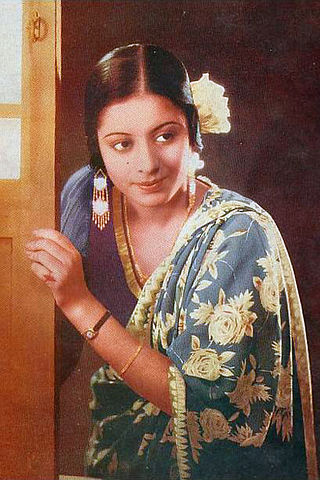
Kanan Devi was an Indian actress and singer. She was among the early singing stars of Indian cinema, and is credited popularly as the first star of Bengali cinema. Her singing style, usually in rapid tempo, was used instrumentally in some of the biggest hits of New Theatres, Kolkata.

Krishnaveni is a 1974 Indian Telugu-language film directed by V. Madhusudhana Rao, starring Krishnam Raju and Vanisri, under the banner of Gopikrishna Movies. The film met with strong critical reception and commercial success upon release. The movie was about a lady suffering from hysteria and the emotional trauma of her family. The film is a remake of the Kannada hit film Sharapanjara (1971).

Mana Desam is a 1949 Indian Telugu-language drama film directed by L. V. Prasad. It was produced by Raja Saheb of Mirzapur under the Sobhanachala Pictures banner, and presented by Krishnaveni. It stars V. Nagayya, C. H. Narayana Rao and Krishnaveni, with music composed by Ghantasala. The film is the debut of actor N. T. Rama Rao in the film industry. It is based on the Bengali novel Vipradas by Sarat Chandra Chattopadhyay, and is set against the backdrop of the Indian independence movement.
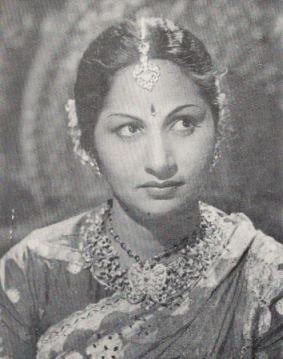
Pasupuleti Kannamba was an Indian actress, playback singer and film producer of Telugu cinema, of Andhra Pradesh, India. She acted in more than 170 films and produced about 25 films in Telugu and Tamil languages during the 1930s to the 1960s.

Anjali Devi was an Indian actress, model and producer in Telugu and Tamil films. She was well known for her role as the Devi Sita in Lava Kusa as well as for the title roles in movies like Chenchu Lakshmi, Suvarna Sundari and Anarkali.
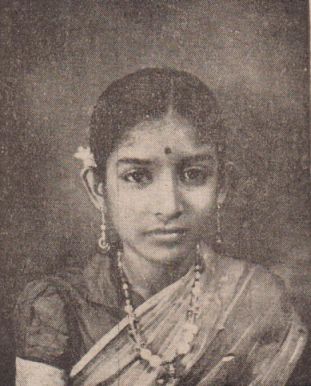
Pillavalu Gajapathy Krishnaveni, more famously known as Jikki, was an Indian playback singer from Andhra Pradesh. She sang around 10,000 songs in Telugu, Tamil, Kannada, Malayalam, Sinhalese, and Hindi languages.
Madhavapeddi Satyam was an Indian playback singer and actor who predominantly worked in Telugu cinema.
B. A. Subba Rao was an Indian film director, producer, and screenwriter who primarily worked in Telugu cinema. He played a pivotal role in shaping the careers of several prominent actors, including N. T. Rama Rao. Subba Rao made his directorial debut with Palletoori Pilla (1950), a film that launched N. T. Rama Rao in his first lead role and became a major success. He went on to direct other notable films such as Raju Peda (1954), Chenchu Lakshmi (1958), and Bhishma (1962).
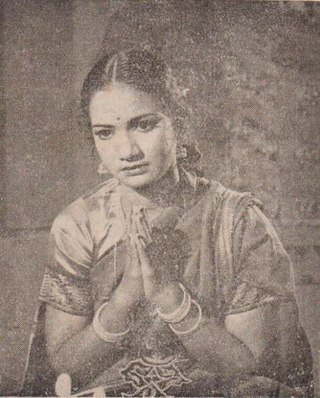
Raavu Balasaraswathi Devi is an Indian singer and actress who performed from 1930 to the 1960s in Telugu and Tamil cinema. She was the first light music singer on All India Radio and the first playback singer in the Telugu cinema.
Rushyendramani was an Indian film actress, playback singer, and dancer from Andhra Pradesh. She had more than 150 films in Telugu, Tamil, Kannada, Malayalam and Hindi films from 1935 to 1986. Her notable films include Sri Seetarama Jananam (1944), Malliswari (1951), Vipra Narayana (1954), Chintamani (1956). Her last film was Sri Shirdi Saibaba Mahathyam (1986).

Jeevitham is a 1950 Indian Telugu-language social guidance film produced by A. V. Meiyappan with his company AVM Productions and directed by M. V. Raman. The film stars Vyjayanthimala in her Telugu cinema debut with S. Varalakshmi, T. R. Ramachandran, and C. H. Narayana Rao forming an ensemble cast, with many actors appearing in other significant roles. Actresses Lalitha and Padmini made guest appearances as stage dancers.
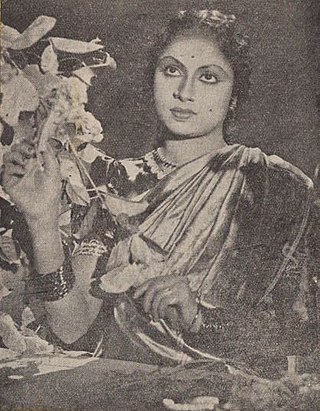
Unjalur Ramayamma Jeevaratnam was an Indian actress, singer, producer and playback singer. Most of her works are in Telugu and Tamil languages.
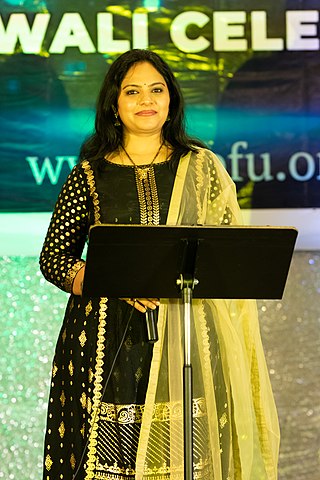
Gopika Poornima is an Indian singer who mostly sings for Telugu, Tamil, and Kannada language films. She became popular with the singing competition Padutha Theeyaga. Her husband Mallikarjun is also a singer and composer in Telugu Film Industry.
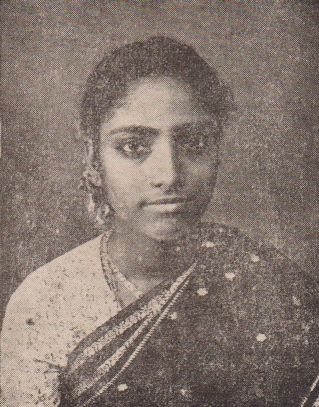
M. S. Rajeswari was an Indian playback singer who has recorded over 500 songs in Tamil, Telugu, Malayalam and Kannada language films.
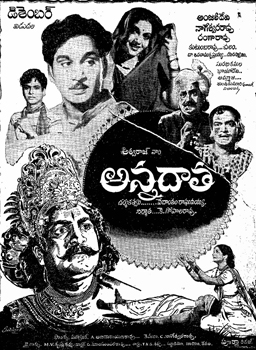
Annadata (transl. Farmer) is a 1954 Telugu-language drama film, produced by K. Gopala Rao under the Ashwaraj Films banner and directed by Vedantam Raghavayya. It stars Akkineni Nageswara Rao and Anjali Devi, with music composed by P. Adinarayana Rao.

Tilottama is a 1951 Indian swashbuckling adventure fantasy film, produced and directed by Raja Saheb of Mirzapur under the Sobhanachala Pictures banner. It stars Akkineni Nageswara Rao and Anjali Devi, with music composed by P. Adinarayana Rao. The film was simultaneously shot in Telugu and Tamil, with the latter being titled Mayamalai. Tilottama was a box-office disaster.

Sobhanachala Studios was an Indian film production company that played a significant role in the early development of Telugu cinema. Established in 1941 in Teynampet, Madras, it was among the first studios in the city owned by a Telugu person. The studio was established by Meka Venkatramaiah Appa Rao Bahadur, the Raja of Mirzapuram, who had earlier produced films under the Jaya Films banner.

Gollabhama is a 1947 Indian Telugu-language swashbuckler film directed by C. Pullayya. Krishnaveni and Raghuramaiah played pivotol roles in the film. The film is produced by Mirzapuram Raja through Sobhanachala Pictures. The film is based on the stories of Kasi Majili Kathalu written in Telugu by Madhira Subbanna Deekshitulu. It was released on 22 February 1947.
















